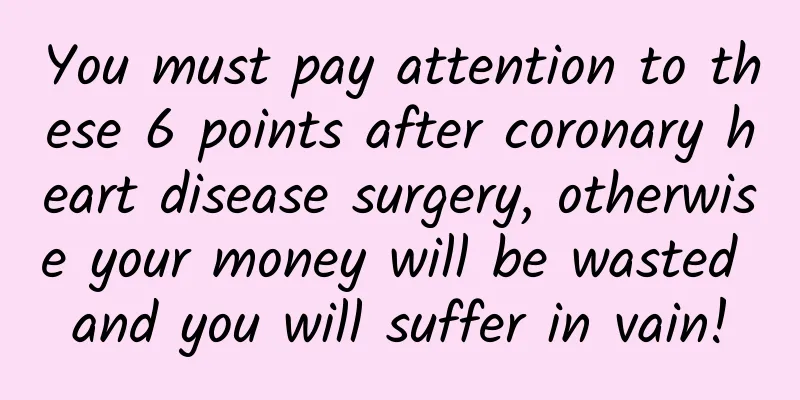You must pay attention to these 6 points after coronary heart disease surgery, otherwise your money will be wasted and you will suffer in vain!

|
Author: Zhang Jianjun, Chief Physician, Beijing Chaoyang Hospital, Capital Medical University Reviewer: Wang Fang, Chief Physician, Beijing Hospital Stents and bypass grafts are effective means of treating coronary heart disease, but if you are not careful after the operation, the blockage will soon occur again, which will be a waste of money and suffering, and it would be too uneconomical. Studies now show that if you change your lifestyle and bad habits after surgery, take some necessary medications, and make psychological adjustments, dietary changes, etc., you can significantly prolong the time it takes for blood vessels to become blocked again. However, if you don't pay any attention, the newly constructed vascular bridge or stent may become blocked in about five years. If you pay good attention, the blockage may be delayed until more than ten years later, or even remain unobstructed for life. Therefore, the issue of postoperative precautions is particularly important. 1. Be sure to take antiplatelet aggregation drugs after stent surgery! For a patient who has undergone a heart stent, it is important to take medication well, especially antiplatelet drugs, such as aspirin, clopidogrel or ticagrelor. This drug may be seen on the list of medications taken when discharged from the hospital. It is a key drug to prevent stent thrombosis. If you do not take this medicine, blood clots are likely to form on the stent, causing blockage, and it will be an acute blockage. After the blockage, it will manifest as myocardial infarction or sudden death. This is very important. 2. Taking statins and lipid-lowering drugs can improve the long-term prognosis of surgery! When blood lipids are deposited on the blood vessel walls, they can cause atherosclerosis and vascular stenosis. So when are blood lipids likely to be deposited? When the blood vessels are damaged. If the blood vessels are very smooth and the blood vessel walls are very intact, blood lipids cannot be deposited. When there are some damages in the blood vessel endothelium, blood lipids can easily sink under the blood vessel walls through these damaged areas. After stenting or bypass surgery, the blood vessels are damaged right after the operation, and blood lipids can easily enter the blood vessels, causing lipid deposition and arteriosclerosis. Therefore, in the period immediately after surgery, it is necessary to strictly take statins to reduce lipid deposition and improve the patient's long-term prognosis. Most of the time, statins alone cannot lower LDL to below 1.8mmol/L, or even lower. When it is below 1.4mmol/L, it needs to be combined with cholesterol absorption inhibitors and/or PCSK9 inhibitors. Figure 1 Original copyright image, no permission to reprint 3. Actively control blood pressure and blood sugar to reduce lipid deposition! We have learned that when blood vessels are damaged, blood lipids are easily deposited. When you have diabetes, the vascular endothelium is soaked in high-sugar blood and is affected. Blood lipids can easily enter under the vascular endothelium and form plaques. When high blood pressure occurs, the blood vessels are stretched so much that blood lipids can enter through the gaps between cells. This includes smoking, because smoking causes particularly great damage to the vascular endothelium. When the vascular endothelium is damaged, blood lipids are easily deposited and arteriosclerosis will form. Of course, when blood lipids are high, they will certainly be prone to deposition. Therefore, actively controlling blood sugar, blood pressure, blood lipids, and quitting smoking can reduce the formation of arteriosclerosis. 4. A reasonable diet and balanced nutrition are also very important! If you eat too much, or too much fat, or have an unbalanced nutrition, it will cause abnormal blood lipid metabolism and lead to high blood lipids. Figure 2 Original copyright image, no permission to reprint Moreover, these blood lipids have a characteristic, that is, after a meal, when the lipids are very high, there is a phenomenon called "post-meal storm". This storm is like river water. Every time it hits the embankment, it washes away the soil on the embankment, and finally the embankment collapses. If we do not eat regularly or our diet structure is unreasonable, it will cause a post-meal storm, which is a sudden rise in blood lipids. The drastic change in a short period of time makes it particularly easy for blood lipids to enter the blood vessel walls and cause arteriosclerosis. Therefore, good eating habits and a reasonable diet structure are very important. 5. Good mood and correct attitude are also beneficial to the prognosis of coronary heart disease! Many people feel very depressed, very melancholy, or very scared after suffering from coronary heart disease. This negative emotion has a particularly great impact on the heart. Current research shows that long-term negative emotions can cause metabolic abnormalities in the entire body. For example, some toxic components in the body can be metabolized by the body, but under the influence of negative emotions, the body will remain in a very lazy state and will not actively metabolize. These toxic components, together with lipids, are all in the blood, constantly impacting the blood vessel walls, causing lipids to deposit quickly in the blood vessel walls, and ultimately causing some adverse consequences. Therefore, after getting sick, a good mood and a correct attitude are very important, and their importance is no less than drug treatment. 6. Adequate sleep and regular rest are also beneficial to the prognosis of coronary heart disease! Poor rest will cause the body to become increasingly lazy, the metabolism of toxic and lipid components will become slower and slower, and blood sugar, blood lipids and blood pressure will become higher and higher. Figure 3 Original copyright image, no permission to reprint In fact, sleep and mood are also related. Everyone must have this feeling that as long as I can sleep well, I will be in a particularly good mood the next day. When I don’t sleep well, I will be in a bad mood the next day, and my blood pressure, blood sugar, and blood lipids may also be abnormal, which is not good for coronary heart disease. Therefore, what kind of stent to choose and how to perform the bypass are things that doctors should pay special attention to. For patients, it is important to correctly understand the disease and prevent and control the disease through medication, sleep, diet, emotions and other factors that they can control. |
>>: Chest pain is not just caused by heart disease, these causes should not be ignored either!
Recommend
What is the use of hot towels for breasts during lactation? What should be paid attention to when hot compressing breasts during lactation?
We all know that pregnant mothers will enter the ...
[Medical Q&A] Is Alzheimer's disease hereditary?
Planner: Chinese Medical Association Reviewer: Ti...
Leucorrhea mostly in strips
Leucorrhea is also an important secretion in the ...
What causes itchy nipples? The earlier you know, the earlier you can prevent it!
When the nipples are a little itchy, many people ...
How to eat bacon and pickles safely, these “unsavory” delicacies?
Review: Experts from the National Health Science ...
Is menstruation normal if the fallopian tube is blocked?
The fallopian tube is a very important part of th...
Why does ovulation cause back pain?
The female cycle is divided into the safe period,...
How effective is gynecological leucorrhea ointment in treating diseases
Aiming at the common causes of abnormal leucorrhe...
Side effects of Fukangfu spray
The operation method of Fufukang spray is to spra...
What are the symptoms of anemia in women? How to regulate?
Anemia is a symptom that most women have, but the...
Women's urine is the color of iced tea
What causes urine to be like green tea? Carefully...
Do the elderly also need sanitary napkins? In this case, it is really necessary!
When it comes to sanitary napkins, the first thin...
Why can't you drink water during painless abortion?
Painless abortion can help women get rid of unwan...
Vaginitis is divided into several types
Vaginitis is a very common gynecological disease....
Why are bayberry bugs afraid of salt water? How long can bayberry be kept?
Bayberry contains vitamin C, glucose, fructose an...









